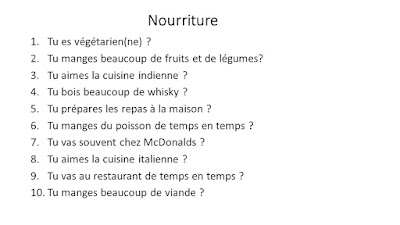Okay, so this is an old classic from the language teaching compendium of games. It's called the yes/no game and I'll quickly explain in case you don't know it.
You could play this with the teacher leading and asking questions, but I'm going to assume this is used a pair game. You give each partner a set of questions which they must ask their partner. The questions must be yes/no questions, i.e. questions which could be answered with a simple yes or no. However, in this case students must not reply with the words yes or no, so full sentence answers are required. Each time a student uses yes or no, they lose a point. The winner loses the least points.
Example (in English):
Q Do you eat lunch in the school canteen?
A I do not eat lunch in the school canteen.
With stronger classes I would encourage students to develop their answers where possible. In the above example, they might say 'I don't each lunch in the school canteen. I eat a packed lunch with my friends in the classroom. I have a sandwich and a chocolate bar'
Smart questioners may try to catch out their partner with quick follow-ups. When the guard is down they are more likely to say yes or no.
The nature of the game is such that students will need to use negatives (assuming they are telling the truth). In fact, most of the answers are likely to be negative if you plan them as such).
This leads to a very unnatural conversation, but I don't mind this at all; the fun element is strong and communication is involved.
As always the activity needs to be clearly modelled beforehand and students need to be confident with negative forms. So I wouldn't use this myself to 'teach' the negative as such.
Here are three slides from my set of ten games on frenchteacher.net. In recent weeks I have been adding lots of starter activities to the Y7, Y8 and Y9 pages of the site.



Comments
Post a Comment